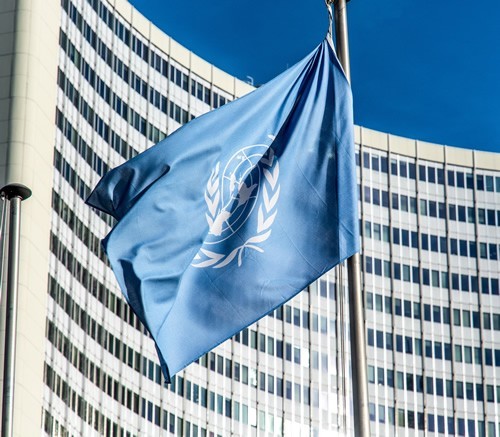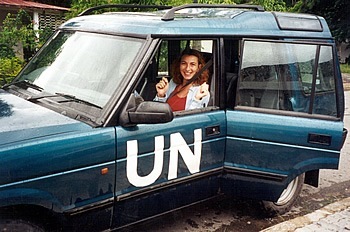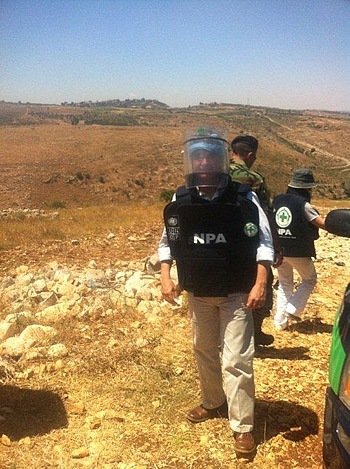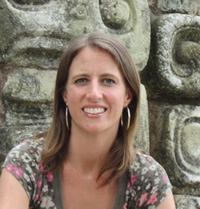How to Get Jobs with the United Nations
The Unauthorized Guide
By Amy E. Robertson
Resources updated 12/30/2023 by Transitions Abroad

|
|
You too can find a job at the United Nations.
|
Implementing a program to increase women’s participation in the labor force. Overseeing a project that provides education to refugee children. Studying transnational disease epidemics and devising ways to contain them. Or providing administrative and logistical services from accounting to security in order to help make any of the above happen. These are just a few of the possible shapes a job with the United Nations can take.
“Although best known for peacekeeping, peacebuilding, conflict prevention and humanitarian assistance, there are many other ways the United Nations and its System (specialized agencies, funds and programmes) affect our lives and make the world a better place. The Organization works on a broad range of fundamental issues, from sustainable development, environment and refugees protection, disaster relief, counter terrorism, disarmament and non-proliferation, to promoting democracy, human rights, gender equality and the advancement of women, governance, economic and social development and international health, clearing landmines, expanding food production, and more, in order to achieve its goals and coordinate efforts for a safer world for this and future generations."
The United Nations is able to accomplish all that precisely because it is an enormous organization with a broad reach. On the flip side, that does mean that it can be a bit unwieldy, and for the uninitiated, a bit hard to understand.
UN System: The Basics
The “main organs” are the General Assembly, the Security Council, the Economic and Social Council, the Trusteeship Council, the International Court of Justice, and the UN Secretariat. (The UN Secretariat in New York is where representatives from the 193 member states gather.) In addition, there are 40 UN programs and specialized agencies, plus another 28 peace operations. These organizations are known informally as the “UN Family.”
The UN employs thousands of aid workers, dedicated to emergency relief and international development. It also employs lawyers, translators, communication officers, IT and HR staff, experts in trade, business, agriculture, environment, education, economics, finance, security, and more.
The UN Secretariat alone (encompassing the “main organs” plus the 28 peace operations) employs some 32,000 staff in organizations around the world. The agencies and funds range in size from a few dozen staff to several thousand. And that’s not even counting consultants and interns. In other words, there are plenty of job opportunities.
Getting Started: Contract Types
When looking at job postings, focus on the ones that fit your residency status. “NO” (National Officer) and “GS” (General Service) positions are exclusively for locally-recruited staff. “Professional” category contracts are open to international candidates, and often come with benefits such as housing and education assistance. If you are an expat living overseas, you do not qualify for local recruitment unless you already have the legal right to work in that country. More information can be found at this helpful blog on contracts and job grades in the UN system. Most jobs start as contract positions rather than staff. Often, there are temporary and consultant positions available as well.

|
|
Zorana Maltar during her time with The United Nations Transitional Administration in East Timor. © Zorana Maltar
|
Canadian-Croatian Zorana Maltar started her career with the United Nations in 1994. “I joined as local staff in Croatia, as a program assistant for a physical rehabilitation program at WHO [World Health Organization]. The work was a mix of admin and program, and it was a one-year, post-conflict job.”
When the contract was over, Zorana decided to give the private sector a try. She joined Coca-Cola’s offices in Croatia, where she was responsible for a mix of marketing and office administration. “I was working 16-hour days, and I didn’t feel the purpose. We were selling sugar water to kids. I put in long days with the UN too, but I prefer to put my time into humanitarian work.”
In April 2000, Zorana found an opportunity for another post-conflict job, this time an HR role with the UN mission in East Timor. It was during her 16 months there that she met her husband José, a Portuguese national working in security for the mission. From there Zorana’s career took her from place to place: to Canada to finish her degree, then on to the United Nations Iraq-Kuwait Observation Mission (until the team was evacuated for the second Gulf War). The UN mission in Democratic Republic of Congo followed, cut short when she took maternity leave. Six years with the UN peacekeeping mission in Lebanon was next, then one year in the Democratic People's Republic of Korea (North Korea — how many people can say that?!). She returned to Lebanon in 2012 to join the Economic and Social Council of Western Asia (UN-ESCWA), where she started in HR and now works in project and property management.
Zorana’s postings may be more adventurous than many, but anyone considering a career in the UN should be open to adventure, and at times, hardship. While Zorana was in East Timor, her two oldest children lived with their grandparents in Canada. She and her youngest currently reside in Beirut (a “family duty station”), but her husband José lives and works with the UN in Syria.
Zorana’s advice?
“Patient persistence. You need persistence in all aspects: trying to find a job, getting informed, understand what you are applying for… And you need to be persistently open to the challenges, which can include security risks and family hardships. And open to different cultures: not just the culture of the country where you are assigned, but to the mix of cultures within the office, as you will often find yourself working with expats from many countries.”
She shared a few additional thoughts for women and parents. “As a woman going to field missions, you have to be practical and prepared, and not romanticize it. The basics of living — where to sleep safely, how and where to keep clean — can be stressful, but not dire if you allow yourself to adjust to different environment. Being a working mother on top of this requires strong family support and understanding. More importantly it requires you to know yourself. Is what I am doing worth it? How does it make me feel about myself? How will my children feel about my choices? Families should know about ‘third culture kids’ (TCKs). Invariably children of UN staff go through this phenomenon, and I wish someone had told me about it, so I could have guided my children through their development with greater awareness.”
|
So how do you get your foot in the door?
One entry point is United Nations Volunteers (UNV). Don’t let the name deceive you: a small living allowance and medical insurance are offered to volunteers, who serve 6-12 month renewable contracts, for a typical service of at least one year. Occasionally, short-term assignments of three months or less are available. There are both national and international volunteer positions available. Minimum age is 25.
Several agencies (UNHCR, UNDP, UNICEF, UNEP) offer entry level positions as Junior Professional Officers. These jobs have age and nationality restrictions, and require candidates to have a couple of years of work experience under their belt. Eligibility and requirements vary by agency, so check the agency employment pages listed below (but if you’re over 35, this isn’t for you).
UNHCR has additional opportunities for a variety of short- and long-term positions, including volunteering.
The UN Secretariat also offers the Young Professional Program (YPP), which seeks to recruit young college graduates from underrepresented countries.
For recent graduates or those in their last year of college, there is an official internship program with the UN Secretariat, and several agencies have internship programs as well (check the individual agency websites below). It is also possible to knock on doors and see if you can create your own internship.

|
|
Luca Renda visits a landmine removal project funded in part by his office, UNDP Lebanon. © Luca Renda
|
My husband, Luca Renda, started working for the United Nations 17 years ago. Through networking, Luca was able to obtain informational interviews with the HR departments of a couple of different UN agencies in New York. He had a five-month stint as an election observer with the UN in Liberia and a freshly-minted Master’s degree under his belt. He was offered an unpaid internship, in the HR department at UNDP.
He took it. After a few months, he was granted a small stipend, and started working closely with a program office. By the year mark, his job morphed into a contract position. In another eight or nine months, Luca became staff with the UNDP’s Bureau for Latin America. That position took our family to Latin America for eight years — first Ecuador, then Honduras. Gradually working his way through the ranks, Luca now serves as the Country Director of UNDP’s program in Lebanon.
His advice?
“If I have to give one piece of advice, it would be to start with field work. Being there gives you a basic understanding of the work of the UN. And ‘field’ doesn’t just mean a job away from headquarters. It means having direct contact with the beneficiaries. Then you understand the real purpose of the job.
Later on, when you might have family, or need better health services, it can be hard to be in the field. You can endure more hardships, challenges and difficulties when you are younger.
The real work of the UN is done at the field level. The more you understand it, the more effective you can be at your job, especially if you go on to become a manager. And you can only understand the field if you have been there.”
|
Jobs for Professionals with Experience
The online job databases listed below include jobs for junior, mid-career and senior professionals. Jobs at the P2 level would be for junior professionals, with minimum 2 years of relevant experience. P3/P4 are mid-career. P5, D1 and D2 are senior positions, for people with 10-20 years relevant experience. Experience with international non-governmental organizations is always a plus, but not always a requisite.
Mandatory retirement age has been a matter of debate in recent years in at the UN, and it is not fully harmonized system-wide. Depending on the agency and year of entry into the UN system, the three main tiers are 60, 62 and 65. Consultancies may still be a possibility for those beyond retirement age.
Online Job Databases
Certain skill sets lend themselves better to one agency or another, in which case you can check for vacancies directly at that agency’s employment page (see below for a complete listing of agencies, with links to their job pages). Some agencies will have only one or two vacancies open at time, while others have dozens of jobs available.
But lots of skill sets (e.g. management, Information Technology, Human Resources and more) are needed at more than one agency. If you don’t have a specific agency in mind, the easiest way to search is through one of the two clearinghouse websites below, which list junior, mid-career, and senior positions:
-
United Nations Careers is the UN Secretariat’s central job platform. Jobs at the New York headquarters are posted here, as are overseas positions in peacekeeping and special political missions. The website also has a wealth of information on the types of jobs and careers available, and the skills needed.
-
UN Jobs is an unofficial but very useful central job platform. This database lists jobs postings with agencies from the entire UN family, searchable by duty station, by organization, and by job function. It also includes job listings with international NGOs (non-governmental organizations).
Insider tip: The UN looks for staff that demonstrate their three core values: Integrity, Professionalism, Respect for Diversity. They also have specific sets of competencies that they seek in every candidate. “Competencies” refers to “the combination of skills, attributes and behaviors which are essential for all staff.” There is an official PDF-format booklet on United Nations Competencies to help understand them better, as well as an official video with Tips on Competency-Based Interviews.
Funds and Programs of the UN Family
Throughout its history the United Nations General Assembly has established a number of programs and funds to address particular humanitarian and development concerns. Brief descriptions of each are available on a section of the United Nations website, and links to their employment pages are below.
Research and Training Institutes
-
World Bank Group: this includes World Bank,International Bank for Reconstruction and Development (IBRD), International Centre for Settlement of Investment Disputes (ICSID); International Development Association (IDA); International Finance Corporation (IFC); and Multilateral Investment Guarantee Agency (MIGA)

|
Amy E. Robertson is the author of Volunteer Vacations in Latin America (2013, Moon Handbooks). Her writing has been published on NPR, Vice MUNCHIES, Budget Travel, Delta Sky, National Geographic Traveler, Wall Street Journal, Christian Science Monitor and Travel + Leisure, among others. Amy has lived in six countries and traveled in more than 60. Her volunteer experiences include building houses in Washington State and Honduras, monitoring presidential elections in Ecuador, working with youth on social documentaries in Bolivia, and serving lunch at soup kitchens in Seattle and Beirut. She has a background in international development and nonprofit management and has worked in both the private and nonprofit sectors.
You may see Amy's many articles for us, her numerous books, and her expanded bio page here.
|
|
